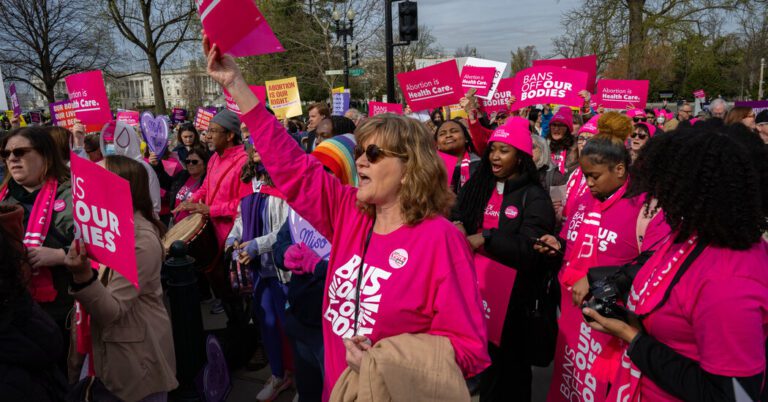
[ad_1]
Bearing colorful signs and banners that read “Doctors Not Doctrine” and “Abortion is Health Care,” hundreds of activists chanted, marched and rallied for hours outside the Supreme Court starting Tuesday morning, before the justices weighed the availability of a commonly used abortion pill.
Supporters of abortion rights outnumbered those opposing abortion, but the two factions occasionally sparred with rallying calls, including over the safety of the pill, mifepristone. (Studies show that is, in fact, safe for terminating a pregnancy.)
Some had traveled across the country to demonstrate. Courtney Brown, a coffee shop owner who helped found an abortion rights group in Amarillo, Texas, where the case originated, described her town as “ground zero” in the fight over abortion.
She added, “I’m just ready to fight back because we’re so tired of having those rights stripped away.”
Circling the court were a handful of small spherical robots containing abortion pills, remotely operated and called “Roe-bots.” Potential recipients would use the “Roe-bot” to complete a telehealth consultation with a provider in a state where the pill is legal, and the machine would then dispense a pill.
Three medical students from New York accompanying the “Roe-bots” emphasized the importance of the case, as future doctors and OB-GYNs who risked facing restrictions on reproductive care.
Supreme Court justices “didn’t go to medical school,” said Sarah McNeilly, a student at Albert Einstein College of Medicine. “You should trust and depend on the F.D.A., which is a world-class institution filled with brilliant people who are very committed to their jobs and you should let them do them and stop trying to politicize science.”
About 13 abortion rights activists were arrested for violating a law against crowding, obstructing or incommoding on the grounds of the U.S. Capitol, according to the Capitol Police. The arrests were part of a plan of civil disobedience meant to underscore the wide-ranging consequences of the case, which could sharply curtail access to the pill and undercut the regulatory authority of the F.D.A. Getting arrested was intended to “match the severity of the threat” to reproductive rights, said Rachel O’Leary Carmona, executive director of the Women’s March, who was among the 13 detained.
The arrests also send a message to the Supreme Court that “no matter what the outcome is, we are going to make sure that people have access to abortion medication when they need it,” she added.
As arguments were underway, activists held dueling rallies on either side of the steps of court. Anti-abortion activists decried casting abortion rights as a women’s health issue.
One such activist, Melanie Salazar, 31 weeks pregnant, had scrawled a message on her bare belly: “Fully Human.” Feeling her baby move, she said, further crystallized her opinions about abortion, fueling a hope for “another win against the abortion industrial complex.”
“My baby is fully human just like I’m fully human and how every child is fully human,” she said.
Celeste McCall, 79, who supports abortion rights, interjected, “I’m fully human, too.”
Ms. McCall, added that she felt the urge to speak alongside Ms. Salazar as “she apparently has been getting bad information, saying that the pills are harmful.”
“I thought we settled this all 50 years ago when I was young,” she said, gesturing toward the court before running off to join a chant. “Haven’t they done enough damage?”
[ad_2]